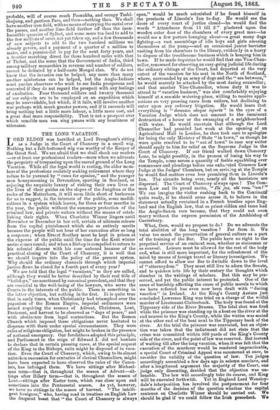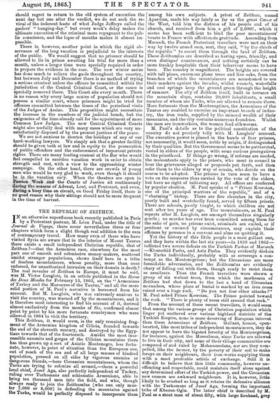THE LONG VACATION. L ORD ELDON was horrified at Lord Brougham's
sitting as a Judge in the Court of Chancery in a small wig. Nothing but a full-bottomed wig was worthy of the Keeper of the Great Seal. We are afraid that we shall shock our readers —or at least our professional readers—more when we advocate the propriety of trespassing upon the sacred ground of the Long Vacation. While all the legal world is resting, the older mem- bers of the professionr esolutely seeking retirement where they refuse to be pursued by " cases for opinion," and the younger men honeymooning in Devonshire, sporting in Scotland, or enjoying the exquisite luxury of risking their .own lives or the lives of their guides on the slopes of the Jungfrau or the rocks of the Matterhorn, it will seem little short of barbarous for us to suggest, in the interests of the public, some modifi- cations in a system which leaves, for three or four months in the year, the public without the summary protection of the criminal law, and private suitors without the means of estab- lishing their rights. When Charlotte Winsor lingers until November or December in her cell, certain of ultimate release from the capital punishment which she so entirely merits because the people will not hear of her execution after so long a suspense ; when Ernest Southey must be kept in prison at the expense of the public until the time for the Kent winter assize comes round; and when a Bishop is compelled to return to his colonial diocese with his case unheard because of the practical closing of the Court of Chancery, it is well that we should inquire into the policy of the present system. Why should the ordinary channels through which imperial justice flows be closed for a fourth part of every year ? We are told that the legal " vacations," as they are called, although they would be better described by their real title of "holidays," are sanctioned by canonical precedent, and that they are essential to the well-being of the lawyers, who serve the Courts in the interests of the public. There is something in the latter objection, but nothing in the first. It is quite true that in early times, when Christianity had triumphed over the paganism of the Roman Empire, imperial ordinances were issued requiring the seasons of Advent, Christmas, Lent, Pentecost, and harvest to be observed as " days of peace," and with abstinence from legal contentions. But the Roman Church which imposed these obligations never hesitated to dispense with them under special circumstances. They were rules of religions obligation, but might be broken in the presence of national emergency. Our forefathers adopted this principle, and Parliament in the reign of Edward I. did not hesitate to declare that in certain pressing cases, at the special request of the King to the Bishops, suits might be disposed of in vaca- tion. Even the Court of Chancery, which, owing to its almost unbroken succession for centuries of clerical Chancellors, might have been expected to have observed the rules of the Canon- ists, has infringed them. We have sittings after Michael- mas term—that is, throughout the season of Advent—sit- tings after Hilary term—that is, throughout the season of Lent—sittings after Easter term, which run close upon and sometimes into the Pentecostal season. As yet, however, we have no sittings in the season of harvest. " The intelli- gent foreigner," who, having read in treatises on English Law the frequent boast that " the Court of Chancery is always open," would be much astonished if he found himself in the precincts of Lincoln's Inn to-day. He would see the doors of every court of justice closed—he would find the words " Attendance from 11 till 2 " plastered upon the wooden outer door of the chambers of every great man—he would see a few porters lounging about—a great many dogs fighting—a vast assemblage of idle boys and girls amusing themselves at the pump—and an occasional junior barrister rushing from his chambers to the library, evidently in a hurry to dispose of the troublesome business which is keeping him in town. If he made inquiries he would find that one Vice-Chan- cellor, renowned for observing an easy-going judicial life during the ordinary sittings of the Court, had departed at the very outset of the vacation for his seat in the North of Scotland, where, surrounded by an army of dogs and the " sea between,' he would scarcely be attacked by the most daring counsellor; and that another Vice-Chancellor, whose duty it was to attend to " vacation business," was also comfortably enjoying himself at a sea-side watering-place, willing to receive appli- cations on very pressing cases from suitors, but declining to- enter upon any ordinary litigation. He would learn that everything is " dantnum absque injuria" in the eyes of a Vacation Judge which does not amount to the imminent destruction of a house or the swamping of a neighbourhood with water. He would ascertain that although the Lord. Chancellor had presided last week at the opening of an, Agricultural Hall in London, he then took care to apologize for being the only Minister of State "in town," as though he- were quite resolved to be "out of town" in case any suitor should apply to him for relief as the Supreme Judge in the- Court of Chancery. If our friend walked down Chancery Lane, he might possibly, in the process of losing his way to. the Temple, come across a quantity of feeble squabbling over summonses and pleadings before one exha'sted Common Law Judge at the Judges' Chambers, but on anis :eg at the Temple he would find matters even less promising than in Lincoln's Inn. The circuits being over, nearly all the barristers are- dispersed. The Court of Chancery always open r. The Com- mon Law and its proud motto, "Ibi jus, ubi remb,1;um I We can imagine the visitor rushing back to the Contined quite ready, if he should come across it, to believe in the statement actually contained in a French treatise upon Eng- land and the English law, that so priest-ridden and tame had the Anglo-Saxon race become, that they could not even marry without the express permission of the Archbishop of Canterbury.
What, then, would we propose to do ? Do we advocate the total abolition of the long vacation ? Far from it. We. value too much the preservation of general culture as a part of the training of the Bar. The public have no right to the perpetual service of an eminent man, whether as statesman or- es counsel. Leisure must be allowed for the rest of the body and, what is still more important, for the refreshment of the mind by means of foreign travel or literary investigation. We cannot afford to allow our Bar to dwindle down to the level of " attorneydom." They must still live to adorn the Senate,. and to quicken into life by their oratory the thoughts which slumber in the writings of scholars. But this may be pre- served, and yet the public interest be protected. One of the cases of hardship affecting the cause of public morals to which, we have referred has even now been dealt with " during vacation" in Ireland. At the King's County Assizes just concluded Lawrence King was tried on a charge of the wilful murder of Lieutenant Clutterbuck. The body was found at the Tipperary side of the River Brusna. The fatal shot was fired. while the prisoner was standing up in a boat on the river at the end nearest to the King's County, while the victim was seated at the other end of the boat next to the Tipperary bank of the river. At the trial the prisoner was convicted, but an objec- tion was taken that the indictment did not state that the crime was committed within 500 yards of the King's County side of the river, and the point of law was reserved. But instead of waiting till after the long vacation, when it was felt that the execution of the murderer would be rendered impracticable, a special Court of Criminal Appeal was summoned at once, to consider the validity of the question of law. Ten judges- accordingly assembled a few days ago in solemn conclave, and after a lengthened argument the majority of the Court, one judge only dissenting, decided that the objection was un- tenable. The law will accordingly take its course, and King will be executed forthwith. Yet in England Lord Wensley- dale's interposition has involved the postponement for four months of the decision of the question whether the capital sentence on Charlotte Winsor should be carried out. We should be glad if we could follow the Irish precedent. We
should regret to return to the old system of execution the next day but one after the verdict, we do not seek the re- vival of the indecent haste of what Judge Jeffreys called the gaolers' " hanging-day." but every week's delay makes the ultimate execution of the criminal more repugnant to the pub- lic conscience, and the lapse of months makes it almost im- possible. There is, however, another point in which the rigid ob- servance of the long vacation is prejudicial to the interests of the public. We would suggest that no prisoner should be allowed to lie in prison awaiting his trial for more than a month, unless a longer time were specially required in order to prepare the evidence in the case. The new winter assize has done much to relieve the gaols throughout the country, but between July and December there is no method of trying a serious criminal unless the offence be committed within the jurisdiction of the Central Criminal Court, or the cause is specially removed there. This Court sits every month. There is no reason why every large centre of population should not possess a similar court, where prisoners might be tried for offences committed between the times of the periodical visits of the Judges of Assize. This proposition might necessitate the increase in the numbers of the judicial bench, but the exigencies of the time already call for the appointment of more Common Law Judges. The new Central Criminal Courts might also usefully deal with many eases which are very un- satisfactorily disposed of by the present justices of the peace.
We are not anxious to shorten the holidays of any of our hard-working lawyers. We simply ask that a greater facility should be given both at law and in equity to the prosecution of public offenders and the enforcement of important private rights. There are many leading counsel at the Bar who would feel compelled to sacrifice vacation work in order to obtain strength and rest, with a view to the approaching winter campaign. On the other hand, there are crowds of young men who would be very glad to work, even though it should i
be in the vacation only. When the theatres are open in Passion Week an& the Courts of Justice sit continuously -daring the seasons of Advent, Lent, and Pentecost, and even, during a busy time on circuit, on Good Friday itself, there is no good reason why their sittings should not be more frequent in the time of harvest.































 Previous page
Previous page